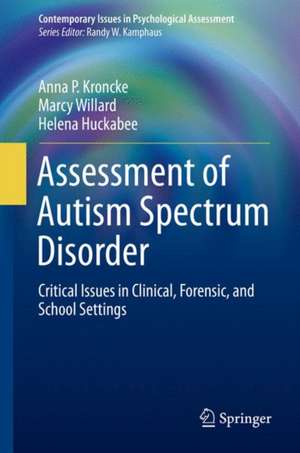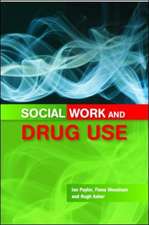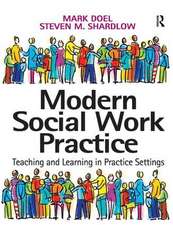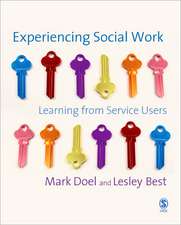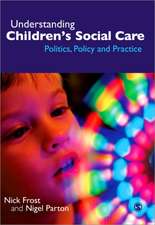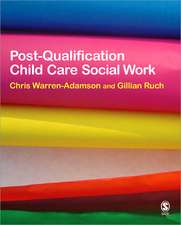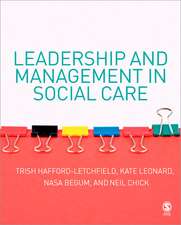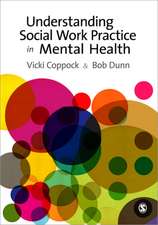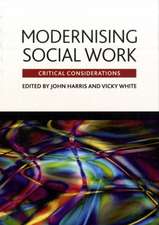Assessment of Autism Spectrum Disorder: Critical Issues in Clinical, Forensic and School Settings: Contemporary Issues in Psychological Assessment
Autor Anna P. Kroncke, Marcy Willard, Helena Huckabeeen Limba Engleză Hardback – 16 feb 2016
This book offers clear best-practice guidelines for the assessment of Autism Spectrum Disorder. It discusses both the rising rates of autism and the growing need for appropriate, effective treatments and services. The book examines measures and methods used in assessing for core symptoms of ASD as well as memory, attention, visual and spatial skills, and other areas relevant to autism assessment. In-depth material on differential diagnosis and a range of comorbid conditions depict the complexities of the assessment process and the necessity of accurate identification. The book's case vignettes and sample recommendations add practical and personal dimensions to issues and challenges surrounding diagnosis.
Topics featured include:
<- A practical guide to the comprehensive assessment process.
- Discussion of the assessment process from referral to recommendation.
- Diagnostic framework for ASD and other disorders
- School-based ASD eligibility evaluation.
- Assessment across the lifespan.
Assessment of Autism Spectrum Disorder is an important tool for clinicians, practitioners, researchers and graduate students in the fields of child and school psychology, behavioral therapy, and social work as well as the related areas of psychiatry, pediatrics,forensic psychology, and educational and healthcare policy.
| Toate formatele și edițiile | Preț | Express |
|---|---|---|
| Paperback (1) | 710.09 lei 43-57 zile | |
| Springer International Publishing – 30 mar 2018 | 710.09 lei 43-57 zile | |
| Hardback (1) | 963.60 lei 43-57 zile | |
| Springer International Publishing – 16 feb 2016 | 963.60 lei 43-57 zile |
Preț: 963.60 lei
Preț vechi: 1175.12 lei
-18% Nou
Puncte Express: 1445
Preț estimativ în valută:
184.41€ • 191.81$ • 152.24£
184.41€ • 191.81$ • 152.24£
Carte tipărită la comandă
Livrare economică 14-28 aprilie
Preluare comenzi: 021 569.72.76
Specificații
ISBN-13: 9783319255026
ISBN-10: 3319255029
Pagini: 546
Ilustrații: XX, 546 p. 52 illus., 27 illus. in color.
Dimensiuni: 155 x 235 x 37 mm
Greutate: 0.97 kg
Ediția:1st ed. 2016
Editura: Springer International Publishing
Colecția Springer
Seria Contemporary Issues in Psychological Assessment
Locul publicării:Cham, Switzerland
ISBN-10: 3319255029
Pagini: 546
Ilustrații: XX, 546 p. 52 illus., 27 illus. in color.
Dimensiuni: 155 x 235 x 37 mm
Greutate: 0.97 kg
Ediția:1st ed. 2016
Editura: Springer International Publishing
Colecția Springer
Seria Contemporary Issues in Psychological Assessment
Locul publicării:Cham, Switzerland
Public țintă
Professional/practitionerCuprins
Part 1: Understanding Autism.- Chapter 1. What is Autism? History and Evaluation.- Chapter 2. The Causes of Autism.- Chapter 3. The Causes of Autism.- Chapter 3. Optimal Outcomes and Recovery.- Chapter Autism in the DSM-5.- Part 2: Conducting an Evaluation.- Chapter 5. Referral and Initial Consult.- Chapter 6. Testing Begins.- Chapter 7. Comprehensive Evaluation.- Part 3: Data Analysis.- Chapter 8. Cognitive and Language Assessment.- Chapter 9. Social and Sensory Assessment.- Chapter 10. Visual, Spatial, and Motor Assessment.- Chapter 11. Attention, Executive Functions, and Memory Assessment.- Chapter 12. Emotions, Mood, Behavior, and Adaptive Assessment.- Part 4: Differential Diagnosis.- Chapter 13. Disorders of Neurodevelopment and Brain Functioning.- Chapter 14. Disorders of Emotion, Mood, and Behavior.- Part 5: Concluding the Assessment Process.- Chapter 15. Feedback, Report, and Recommendations.- Chapter 16. Case Examples from Referral to Recommendation.- Part 6: Assessment in Applied Settings and Special Testing Considerations.- Chapter 17. Forensic Assessment for Autism Spectrum Disorder.- Chapter 18. School-Based Assessment.- Chapter 19. School, Parents, and Community Partnerships.- Chapter 20. Assessment Across the Lifespan.
Notă biografică
Anna Kroncke, Ph.D., NCSP, is the Director of Psychological Services at Emerge, a private practice in Denver CO, specializing in diagnosis and treatment of autism spectrum disorders as well as other mental health issues. She earned a bachelor’s degree in Psychology from the University of North Carolina at Chapel Hill, a master’s degree and a Ph.D. in School Psychology from the University of Georgia, where she was awarded a Presidential Fellowship. Her research and clinical interests are in psychological assessment, autism spectrum disorders, and early identification of emotional and behavior problems in children. She has co-authored various book chapters and professional presentations on learning disabilities, cognitive assessment, and social-emotional assessment while working with Randy Kamphaus, Ph.D., at the University of Georgia. She completed her postdoctoral work in psychological assessment in Atlanta GA. Dr. Kroncke worked for five years as a school psychologist in diverse urban school districts and has been in private practice at Emerge specializing in autism assessment and treatment since August 2010.
Marcy Willard, Ph.D., is a Licensed School Psychologist and a Postdoctoral Fellow at Emerge. Dr.
Willard completed a Bachelor’s Degree at the University of Colorado; a Master’s Degree in Psychology from Pepperdine University; and a Ph.D. in Child, Family, and School Psychology from the University of Denver. Dr. Willard’s clinical specialty is in the area of autism evaluation and treatment. She is published in the field of electronic collaboration and peer review in academic research. She was awarded a fellowship with JFK Partners, Center of Excellence for Autism and Neurodevelopmental Disabilities at University of Colorado Medical School and the Children’s Hospital. She developed a proprietary assessment of visual imagery for children with autism for her dissertation under the supervision of Dr. Susan Hepburn,nationally recognized autism researcher; and Dr. Gloria Miller, an expert in school psychology. She completed her Pre-doctoral Psychology Internship for Emerge; conducting psychological, neuropsychological and forensic evaluations, providing therapy to clients and consulting with schools. She now works as a school psychologist and post-doctoral clinician serving primarily pediatric populations.Helena Huckabee, Ph.D., BCBA-D, is a Pediatric Neuropsychologist, Clinical Psychologist and Board Certified Behavior Analyst. She received her bachelor’s degree in Geological Engin
eering from the Colorado School of Mines and Master’s and Doctorate degrees in Clinical Psychology from the University of Houston. Dr. Huckabee completed an internship at Baylor College of Medicine with postdoctoral fellowships at DePelchin Children’s Center and JFK Partners at the University of Colorado. Dr. Huckabee’s research studies have involved understanding intelligence and language skills in children with autism, the role of serotonin in mood disorders, self-injurious behaviors, brain anoxia, and treatment outcome in autism. Dr. Huckabee has previously held administrative leadership positions at five clinics for autism spectrum disorders, including the Universities of Houston TX and Colorado. Ironically, Dr. Huckabee’s son was diagnosed with autism when she was in graduate school. With compassion and competence, she provides counseling for individuals and couples as well as leads parent groups in the community. Textul de pe ultima copertă
This book examines current and emerging techniques for the dynamic and evolving field of autism assessment. It provides a detailed, research-based discussion of the latest innovations in assessment from a practical perspective accumulated from decades of autism assessment and treatment training and experience in both educational and clinical settings. The book provides personal insights into the engaging and intriguing autism population and case studies of children who have captured the hearts and minds of clinicians nationwide. As the rates of autism have grown more than 10-fold during the past decade, researchers have questioned whether unclear diagnostic guidelines may be to blame for the high numbers of recently diagnosed children. Rather, the authors argue, tighter agreed upon methods for diagnosis of autism have allowed for more accurate identification of children who indeed require supportive treatments and therapies. This unique volume provides readers with clarity aboutbest-practice assessment approaches from sequential and pragmatic perspectives as well as an understanding of critical issues and hurdles in ascertaining the appropriate diagnosis. In addition, myriad potential comorbid conditions or differential diagnoses are addressed. This book is a must-have resource for clinicians and practitioners as well as researchers and graduate students in the fields of child and school psychology, behavioral therapy, social work, psychiatry, pediatrics, forensic psychology, and educational and healthcare policy.
Caracteristici
Examines emerging techniques and innovations in the assessment of children with autism Explores how more accurate identification of children with autism is leading to improvements in supportive treatments and therapies Offers best-practice assessment approaches and treatments from sequential and pragmatic perspectives Describes how to ascertain appropriate diagnoses in the face of critical issues and comorbid conditions Includes supplementary material: sn.pub/extras
